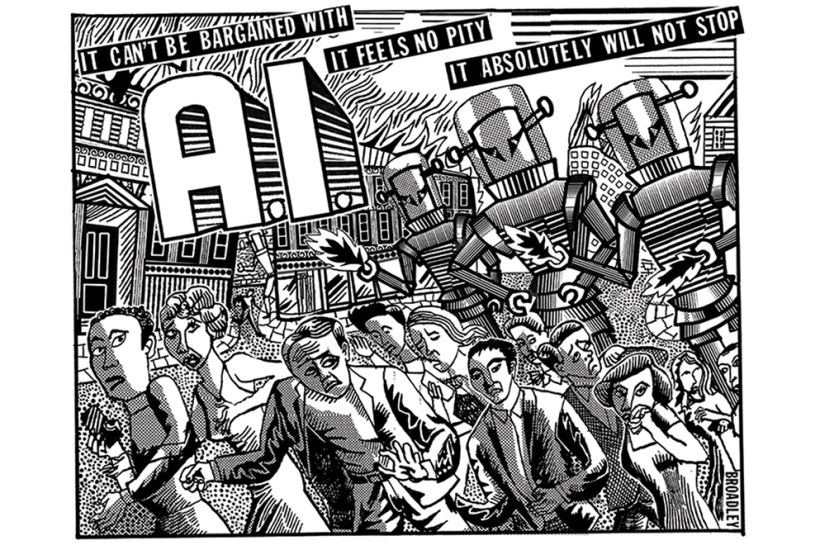Parris review
Sir: Matthew Parris (‘Coutts, Farage and the trouble with choice’, 29 July) omitted to mention the initial, fundamental and obvious matter of the breach of client confidentiality committed by Dame Alison Rose, who he says should not have resigned. This is surely the gravest offence any bank official – let alone the head of NatWest – can commit. Yet he puts her resignation down to a ‘silly media storm’, which was actually started by the BBC, to whom the client information was given. Further, his article relates mostly to the discretion which institutions such as banks have in choosing who to admit. But this issue wasn’t about a client’s admission to the bank, it was about expelling one for his ‘views’. Parris’s column did, though, raise questions about what we know about the kind of clientele our own banks have. How do we know who banks with our bank? How could we find out? Would it matter? And what could we do if it did?
John C. Batey
Oxford
Evasive procedure
Sir: Matthew Parris makes a fair point about the freedom of businesses to select their customers. What is not acceptable is their refusal to give truthful reasons for their actions – often declining to communicate at all. This evasiveness is frequently justified on bogus grounds of security, confidentiality or commercial sensitivity.
Anthony E. Kedros
Oxford
Cry Woolf
Sir: I was gratified on reading James Delingpole’s review of University Challenge (Arts, 29 July) that it isn’t necessarily cerebral atrophy which has reduced my ability to answer the arts-based questions. However, I must take issue with his casual dismissal of Virginia Woolf’s Mrs Dalloway as ‘unreadable’. This short masterpiece is a jewel in Woolf’s crown. When I offered it up to my reading group many years ago, the ensuing debates sizzled and soared.
Linda Willby
Thornton Le Dale, North Yorkshire
New kid on the block
Sir: A couple of points about Rod Liddle’s latest (‘Intersectionality is a dud’, 29 July). Firstly, his definition of intersectionality – I thought it meant the existence of more than one minority attribute (or ‘protected characteristic’) in a person or group. Second, Matty Healy is demonstrably not ‘thick as mince’. He is rather clever and funny and a very naughty boy, who has presumably managed to get all the attention he wanted for his onstage snog in Malaysia. Now everyone has been reminded of him and his ‘awful band’ the 1975 (who are actually pretty good). I suspect this is a veteran provocateur being a little jealous of a newer one.
Elizabeth Street
London W1
Relatively speaking
Sir: James W. Phillips and Eliezer Yudkowsky’s dystopian views on artificial intelligence made for thoughtful reading (‘We need to be terrified for our lives’, 15 July). But I take issue with one of their comments: that ‘most scientific discoveries in history were done by individuals like Albert Einstein’. Einstein himself acknowledged his debt to his predecessors, Newton, Faraday, Maxwell. His theory of relativity presupposed familiarity with the Michelson-Morley experiment on the absence of evidence for ether drift. Relativity itself was in the air at the turn of the 20th century, in the work of Einstein’s friend Hendrik Lorentz, and the theorising of Henri Poincaré. No scientific discovery is made completely out of the blue, but always depends on a hinterland of prior knowledge, acquired by the labours of many other people. That is the secret of humanity’s success: linguistic and social co-operation. This, I think, gives us a glimmer of hope that AI will not prove a catastrophe, but may well become a boon.
John Grabinar
Beer Sheva, Israel
Binary thinking
Sir: I much admire Rory Sutherland for his radical thinking, but I do wonder if, when discussing cars (The Wiki Man, 15 July), he does not fall into the binary trap. Why not the best of both electric technology and the internal combustion engine: namely the pure hybrid? I get 67mph from my Corolla, and the ingenuity of regenerative braking means that when powering up the battery system there is no call upon an expensive grid system, subsidised green energy or, if driving in Germany, brown coal. OK, the compromise does not get rid of hydrocarbons completely, but then the emissions target is not absolute zero.
David Starkie
Andover, Hampshire
Derby football
Sir: I am sorry to disappoint Sam McPhail (‘Own goal’, 29 July), but in the league where I watch football (National League North) there’s no danger of supporters following players rather than their club. At the end of last season we – Boston United – lost three long-standing and respected players to Buxton, but when we play them in the first game of next season loyalty to our club will of course come first. And had the players moved in the opposite direction, I am confident that Buxton fans would react in the same way. We non-leaguers are not swayed by money or fashion.
David Whittle
Oakham, Rutland
Striking difference
Sir: Mary Wakefield writing about ‘action short of a strike’ (‘There is no plan! You’re on your own!’, 22 July) brought to mind the West Indies in the 1970s, when the baggage handlers at Port of Spain airport in Trinidad exercised a rather more charming ‘withdrawal of enthusiasm’.
Matthew Robinson
London SW9
Write to us: letters@spectator.co.uk
Got something to add? Join the discussion and comment below.
Get 10 issues for just $10
Subscribe to The Spectator Australia today for the next 10 magazine issues, plus full online access, for just $10.
You might disagree with half of it, but you’ll enjoy reading all of it. Try your first month for free, then just $2 a week for the remainder of your first year.








Comments
Don't miss out
Join the conversation with other Spectator Australia readers. Subscribe to leave a comment.
SUBSCRIBEAlready a subscriber? Log in